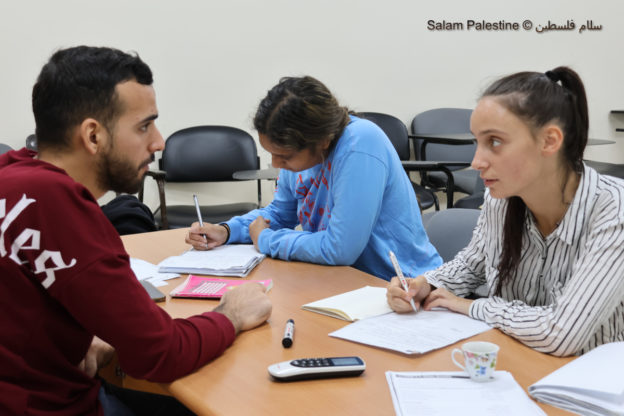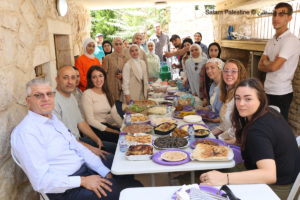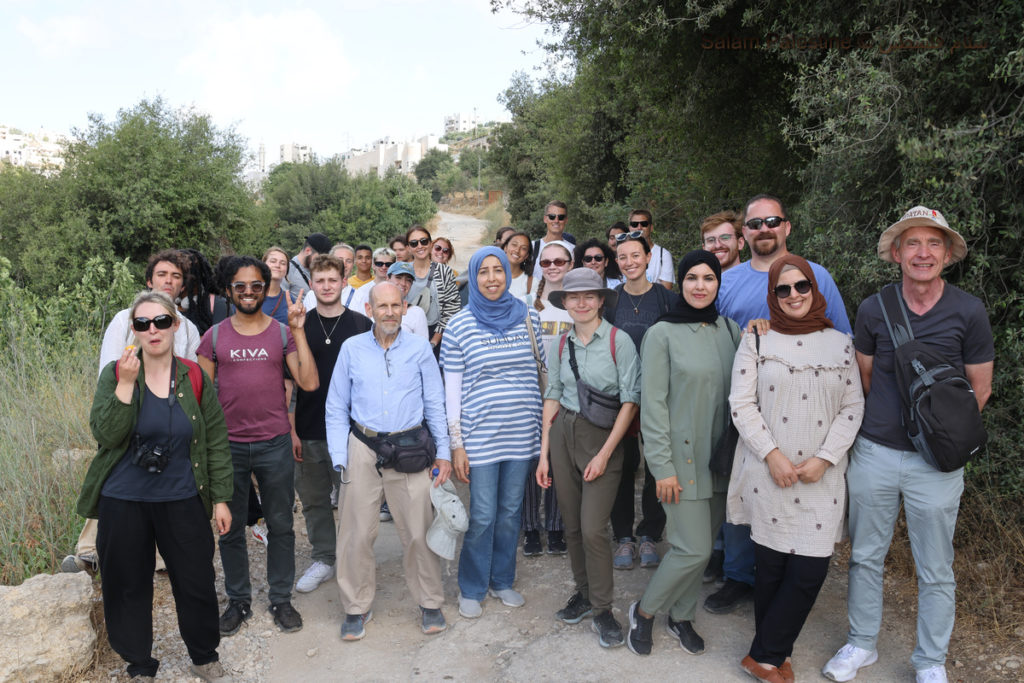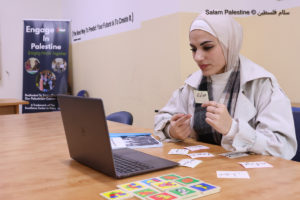Modern Standard Arabic (MSA) Program: Salam Palestine offers Super Intensive, Intensive, and Non-Intensive Modern Standard Arabic (MSA) courses across 6 levels, from absolute beginner to advanced. MSA is the international standard for Arabic and is highly useful for international communication. It is highly advisable to create a strong foundation with MSA before moving on to a chosen dialect.
Salam Palestine’s Modern Standard Arabic program provides students at every level with a comprehensive and personalized journey into Modern Arabic. They will learn all about its formulaic sentence structure, expressive vocabulary, and artistic script from qualified, native-speaking teachers in the heart of the Levant and Middle East.
It is often said that language is a reflection of culture. While generalizations of language and nationality can be tenuous in their value, MSA does speak to the dramatic and vibrant heart of the diverse Arab world.
Our Modern Standard Arabic (MSA) Programs offer flexible options and are available year-round. This includes a one-week intensive course as well as a three-month (13-week) program. Whether you prefer a short-term or longer-term intensive Arabic course in Jerusalem, Tel Aviv, the West Bank, Israel, or the Middle East area, or if you are interested in immersing yourself fully in the cultural experience, we are here to cater to your needs. You have the freedom to choose the timing and level of study that best aligns with your learning preferences. This includes language proficiency level and any other specific requirements or preferences you may have.
Intensive Modern Standard Arabic Program in 2025/2026
Salam Volunteer in Palestine is now accepting applications for the Intensive Modern Standard Arabic Program, including the summer course and online MSA lessons, for the 2025/2026 period.
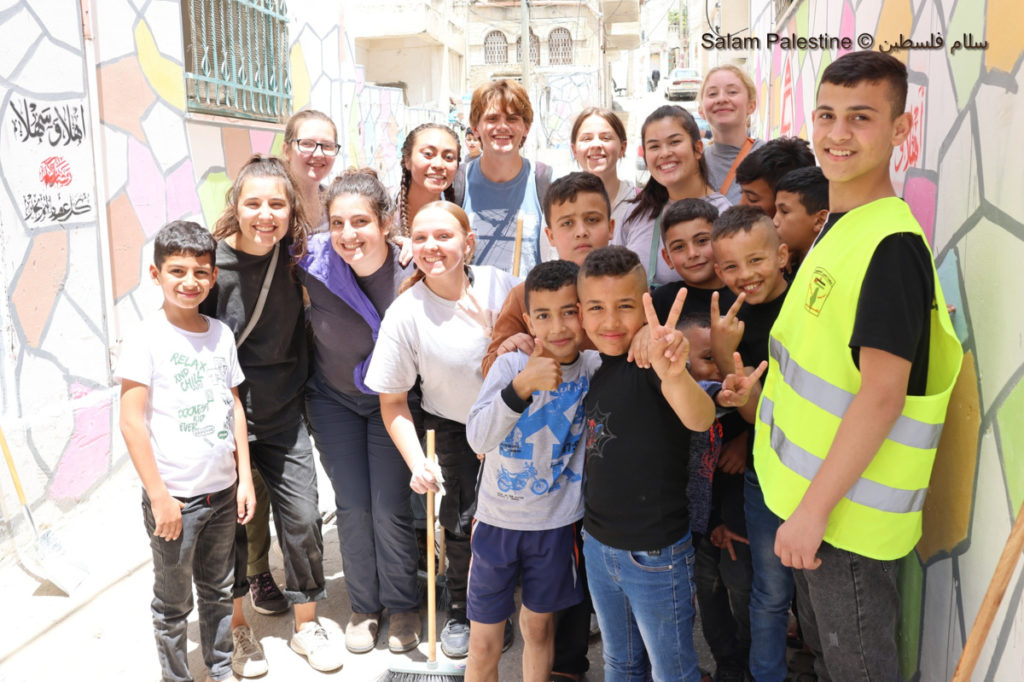
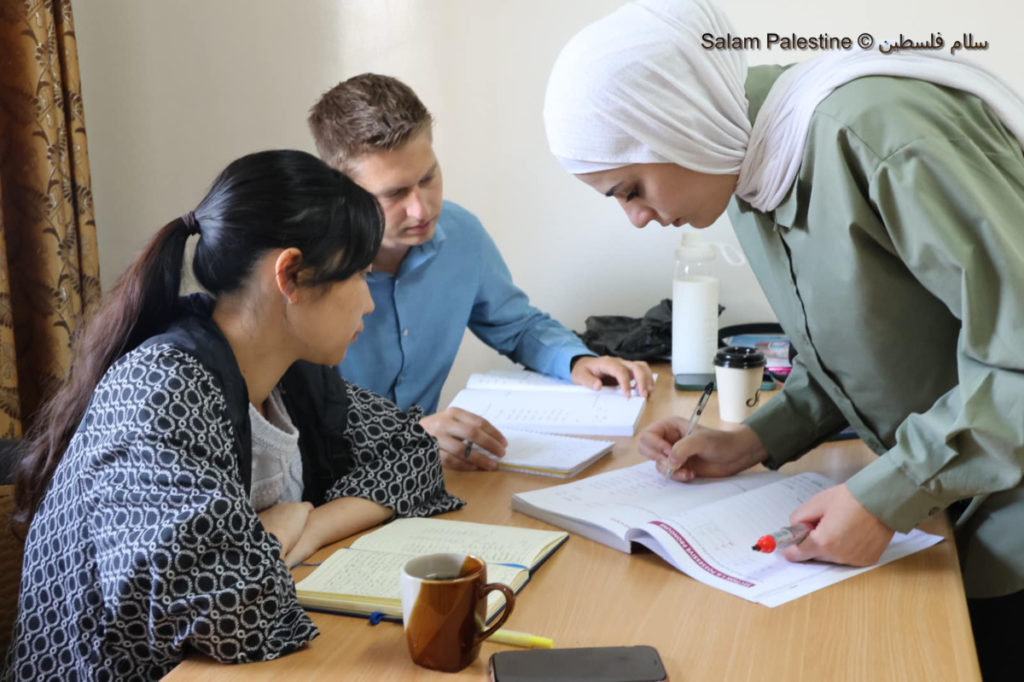
This program offers an excellent opportunity for individuals looking to master Modern Standard Arabic. It focuses on formal language skills used in reading, writing, and formal speech. The courses are designed for all proficiency levels, from beginner to advanced, providing a comprehensive foundation in the language.
Table of Contents
What is Modern Standard Arabic?
Modern Standard Arabic is the standard Arabic that forms the basis of all Arabic dialects. Most famous of which, across the Arab world, are Levantine, Ammiya, Egyptian, and North African. Therefore, it is also one of the most widely spoken languages in the world. It is one of the official languages of the United Nations and is an official language in 25 countries. This includes every member of the Arab League: Algeria, Bahrain, Comoros, Djibouti, Egypt, Iraq, Jordan, Kuwait, Lebanon, Libya, Mauritania, Morocco, Oman, Palestine, Qatar, Saudi Arabia, Somalia, Sudan, Syria, and Tunisia.
Naturally, there are many dialects of Arabic. Luckily, MSA has become a multinational unifier of Arabic speakers who would otherwise find it quite difficult to communicate. MSA is therefore one of the most reliable ways to communicate with Arabic speakers. You could use it anywhere across the Middle East and North Africa, as well as with the wider Arab diaspora.
MSA was first developed in the 19th century to overcome the barrier posed by the many dialects of the Arab World for publications and communication. Since its initial development, MSA has quickly become the contemporary standard for literary, legal, and academic publications and media used in an international context.
A Close Relationship to Classical Arabic
Regardless of dialect, the vast majority of Arabic speakers will be able to recognize Standard Arabic as it derives directly from the Classical Arabic found in the Qur’an and other historical texts. Additionally, many Arabic dialects share much of their lexicon with MSA, similar to classical Latin’s relationship to contemporary romance languages. Students who study Modern Standard Arabic are thus better prepared to interact with and understand the multitude of Arabic dialects.
The terms Modern Standard and Classical Arabic are sometimes used interchangeably, so it’s important to settle any confusion. Classical Arabic – also known as Qur’anic Arabic – is a form of Arabic that dates back to the 7th century and the founding of Islam.
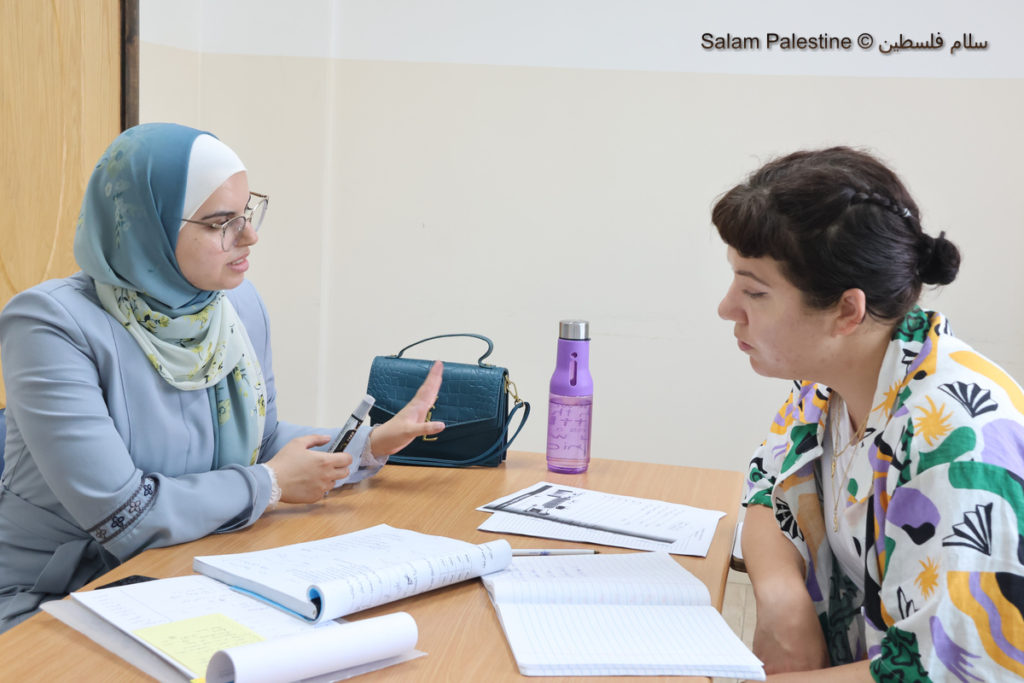
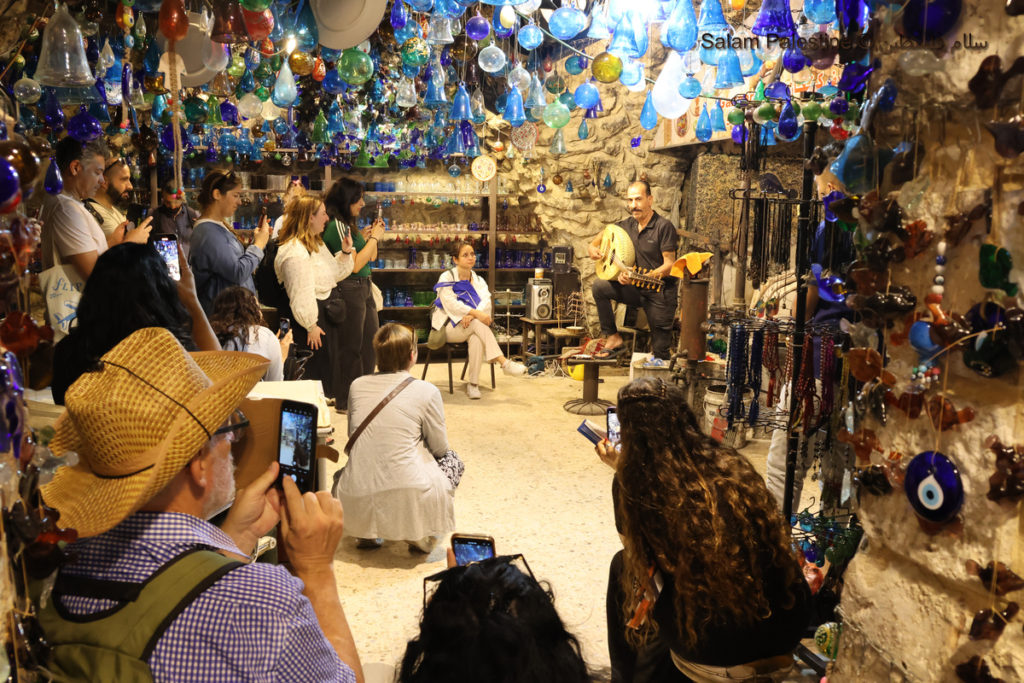
Modern Standard Arabic is based on this classical style and very closely resembles Classical Arabic, with some minute differences such as their stylization and method of diction. However, Classical and MSA are considered by many to be synonymous, and even the Arabic word FusHa does not differentiate between the two. Therefore, those who enroll in the MSA Program will be well-equipped to understand higher literary forms of Arabic, including those in the Qur’an.
Differences Between Modern Standard Arabic (MSA) and Levantine Arabic?
Modern Standard Arabic (MSA) is the standardized form of the Arabic language. As such, it is used in formal contexts, such as media, literature, education, and official speeches. It serves as a common language among Arabic-speaking countries. MSA follows a strict grammatical structure and vocabulary, adhering to formal register and grammatical rules. It is largely based on Classical Arabic and incorporates vocabulary from Classical and Quranic sources. MSA has a more standardized pronunciation that is taught in educational settings, based on the classical pronunciation of Arabic. It is consistent across Arabic-speaking countries, enabling speakers from different regions to understand each other in formal contexts.
Levantine Arabic, on the other hand, is a spoken dialect used in everyday conversations in the Levant region, including countries like Lebanon, Syria, Jordan, and Palestine. Levantine Arabic has its distinct grammar and vocabulary, with grammar rules more flexible than MSA. It is less formal and more dynamic, incorporating loanwords from other languages like Turkish, French, and English due to historical influences. Levantine Arabic also has specific pronunciation patterns that may differ from MSA and vary within different regions of the Levant. It exhibits regional variation, with slight differences in vocabulary or pronunciation. Its usage varies between different cities or areas within the Levant region.
While MSA is primarily used in formal contexts, Levantine Arabic is the colloquial form of Arabic used in daily life in the Levant region. Many Arabic speakers in the Levant are bilingual and can switch between MSA and Levantine Arabic depending on the situation and audience.
Why Study Modern Standard Arabic?
As Arabic has become one of the fastest-growing languages worldwide, students from across the globe are finding that MSA is ideal for those who wish to gain a strong foothold in the Arabic language and for those who plan to expand their knowledge of colloquial variants later.
The language itself is widespread, as it is the primary form of Arabic taught in schools across the Middle East and North Africa (MENA). Arabic speakers across the region can therefore use it as a means of communication between speakers of different Arabic colloquialisms, and students studying MSA can likewise use it to communicate while traveling throughout the MENA region.
MSA is the standard lingua franca in important areas related to literature, news, media, politics, academia, diplomacy, law, international business, and much more, all across MENA. Studying MSA gives one access to the literary world of Arabic and opens doors to professional advancement in a plethora of fields.
How Are Classes Conducted?
Students of Salam Palestine can expect to gain a strong understanding of Arabic while enjoying a fully immersive experience. The Arabic immersion program will introduce them to Arab culture and customs while allowing them to converse with native speakers. Students will essentially have two options in terms of class style: one-on-one or small groups
1- One-on-one
Students will have private lessons with one of our qualified Arabic language teachers, allowing for a more personalized approach to instruction. This also ensures that the student will have the instructor’s full attention while allowing the instructor to fully focus on any questions that the student may have.
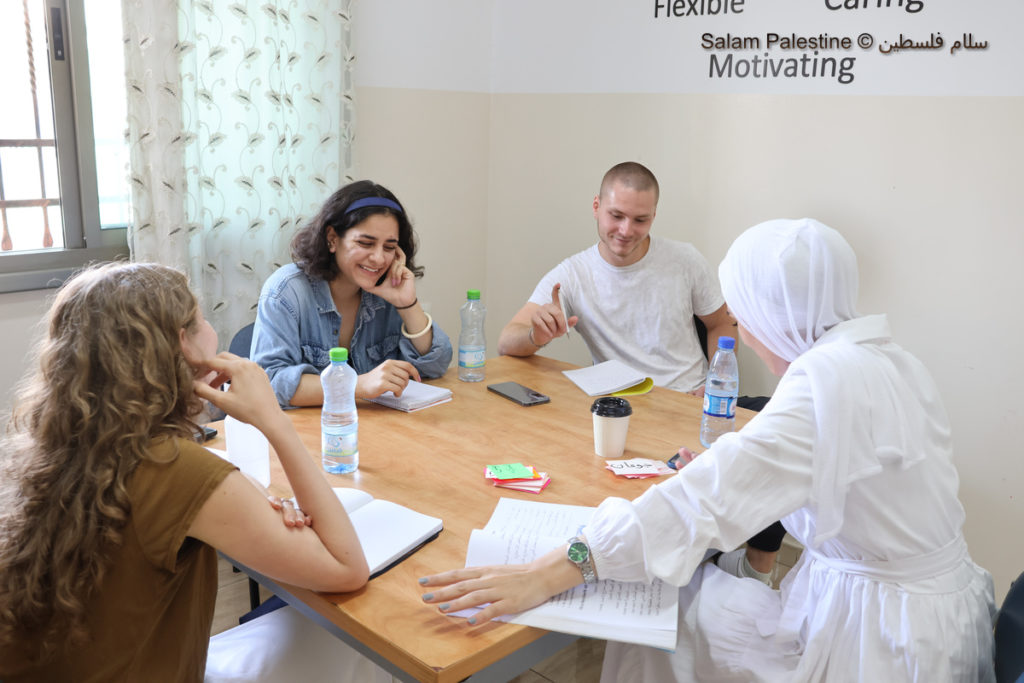
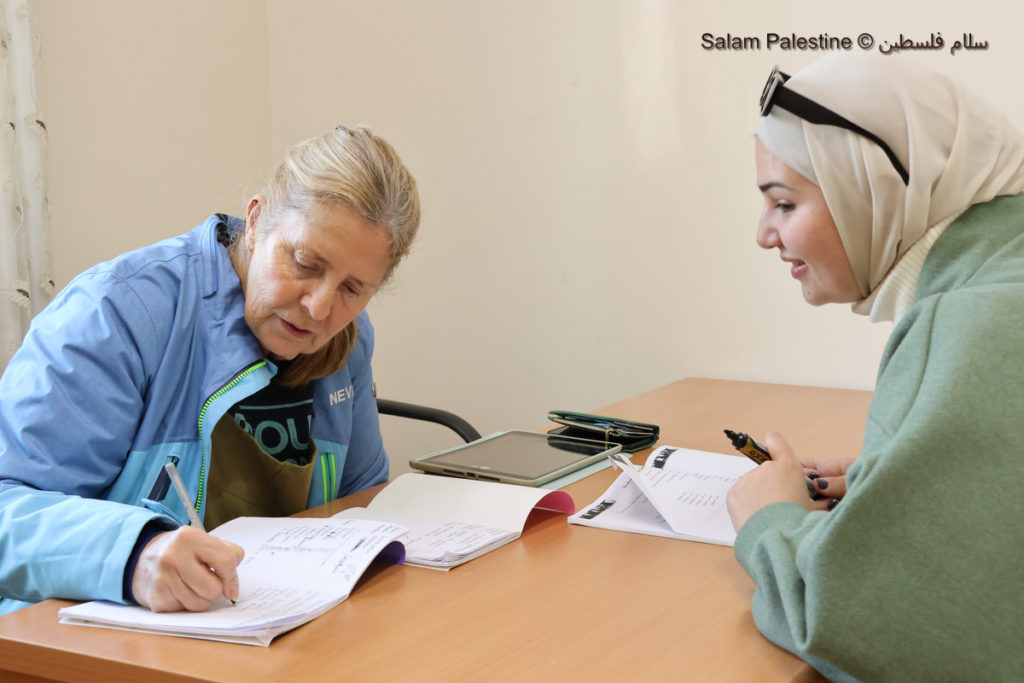
2-Small groups
Typically 2 or 3 students, with a maximum of 5. While one-on-one courses are more personalized, small groups allow for structured interaction with peers at similar language proficiency levels, which is often an effective strategy for fostering collective linguistic growth. Students will be able to practice their Arabic together, collaborate on group projects, enjoy class excursions, and much more.
In Which Language Is The Program Run?
All of our programs are geared toward English speakers. For the sake of immersion, however, the higher the Arabic course level, the less English you will use in the classroom. Students should note that the city of Hebron is predominantly Arabic-speaking.
When navigating through Hebron, students will need to utilize their Arabic and rely on their skills to the best of their ability, thereby creating a fully immersive experience perfect for practicing real-world situations.
Qualified Teachers
Salam Palestine prides itself on its faculty and staff, all of whom are native Arabic speakers. Many of our teachers also have degrees in various related fields such as Teaching Arabic to Non-native Speakers, Teaching Arabic as a Second Language, Arabic Cultural Studies, Arabic Literary Studies, and many others.
Arabic Course Levels
1- Beginner:
The Beginner’s MSA course is for students with absolutely no previous Arabic language experience. This course will introduce students to the Arabic alphabet, fundamentals of grammar, phonetics, and common vocabulary and phrases. The Beginner’s MSA program will create a strong foundation from which students may choose a dialect to study.
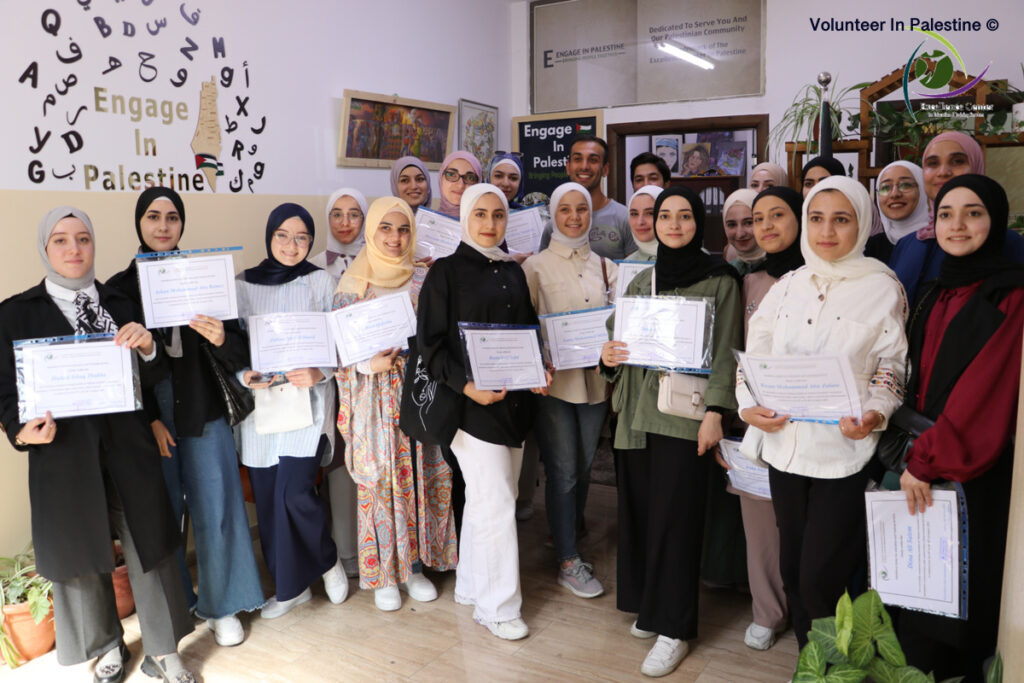
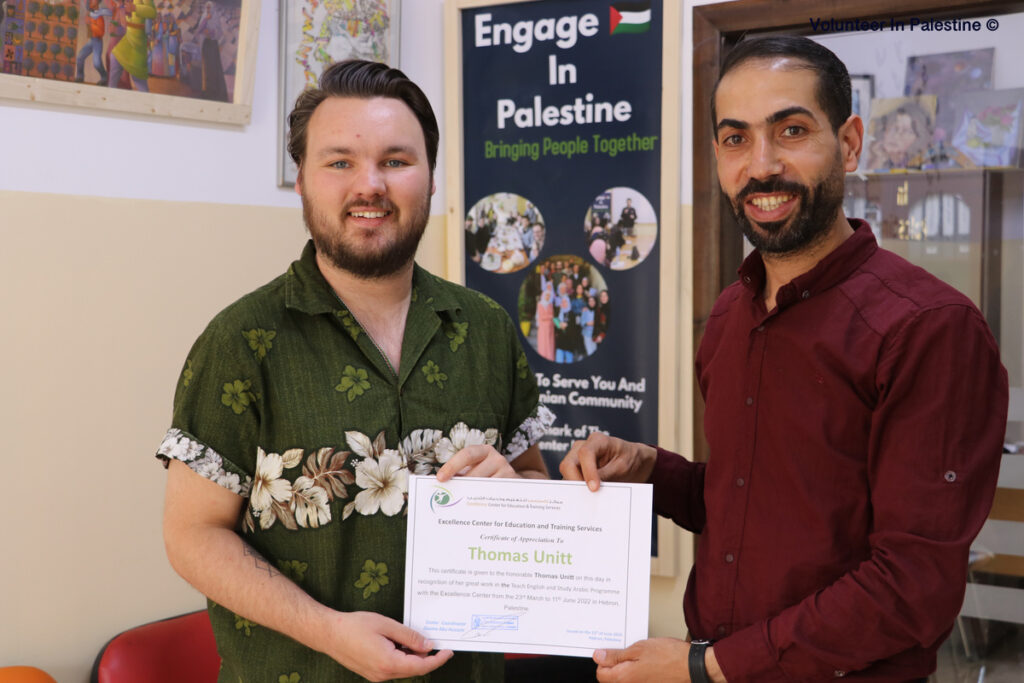
2- Elementary 1:
This Modern Standard Arabic course continues to entail introducing new vocabulary and slightly more complex grammatical rules into the curriculum, as well as regular reading, writing, and speaking exercises. Upon the completion of this course, students will be able to converse, read, and write about elementary subjects such as shopping, asking for directions, and expressing preferences.
3- Elementary 2:
This level builds on the Elementary Level 1 course, expanding into ever more intricate territory. This course will diversify vocabulary even further and will expand on topics introduced in the previous level. Students will still focus predominantly on elementary subjects, they will also explore the more complex grammatical structures.
4- Intermediate 1:
This Modern Standard Arabic course will introduce students to a more immersive curriculum than previous levels. This includes venturing into the Palestinian community of Hebron to communicate with native speakers and complete everyday tasks. Students may purchase items from a Palestinian market, order from a restaurant, or discuss their preferences on a certain topic. Students will also get to know subjects such as culture, art, and politics, and will learn the vocabulary needed to converse on these topics concisely.
5- Intermediate 2:
This Modern Standard Arabic course’s target is fluency and immersion in the language. As a result, this course level will focus mainly on comprehension in the context of listening, writing, reading, and speaking. It will involve the practical application of Arabic through interactions with shopkeepers and other locals in the community of Hebron.
6- Advanced:
The Advanced Modern Standard Arabic Course will combine all the previous courses’ curricula in a completely immersive manner, while expanding into more complex reading, writing, and speaking exercises. Students will also conduct research in the community of Hebron on a variety of subjects. Here, students will be approaching fluency beyond any previous levels. Upon completion of this course, students will be able to articulate their thoughts and opinions on complex matters such as politics, history, the environment, and the arts of Palestine and the Arab World.
Modern Standard Arabic (MSA) programs offered by Salam Palestine:
| Program | Description |
|---|---|
| Intensive Arabic Language Program | Offers intensive MSA courses for non-native speakers. The program focuses on developing language skills through immersion and interactive learning methods. |
| Arabic Language and Palestinian Culture Program | Combines MSA classes with cultural activities and excursions to provide a comprehensive learning experience. Students gain insights into Palestinian history, traditions, and daily life while improving their Arabic skills. |
| Online Arabic Language Courses | Provides online MSA courses for individuals who are unable to travel to Palestine. The courses are designed to be interactive and personalized, with experienced instructors guiding the learning process. |
| Arabic Tutoring and Language Exchange | Offers one-on-one Arabic tutoring sessions with qualified instructors who tailor the lessons to the student’s needs and proficiency level. The center also facilitates language exchange opportunities for practicing Arabic with native speakers. |
| Arabic for Specific Purposes | Provides tailored MSA courses for specific purposes, such as business Arabic, media Arabic, or academic Arabic. The program aims to develop language skills in specialized contexts to meet students’ specific goals. |
Course Intensities
Modern Standard Arabic Course intensity signifies the number of hours spent in class, as well as their level of immersion and the amount of assigned homework.
1. Non-Intensive:
We recommend that students who are interested in a long-term program from one to three months in duration enroll in non-intensive courses. This will provide you with plenty of in-class instruction (12 hours a week) while still leaving you with ample time to explore the city of Hebron and immerse yourself in Palestinian culture.
2. Intensive:
This course is designed to further immerse students in the Arabic language and culture. These courses are held 5 days a week for approximately 4 hours each day, giving a total of around 20 hours of instruction per week. Intensive Arabic courses will also include additional homework and out-of-classroom assignments for participants.
3. Super-Intensive:
These courses are designed for students who are looking for accelerated Arabic tuition in a completely immersive, high-intensity classroom setting. Super-intensive Arabic courses are conducted 5 days a week for 6 hours per day, giving a total of approximately 30 lesson hours per week. We recommend that those who are intending to study for less than a month or want a challenge to enroll in this program.
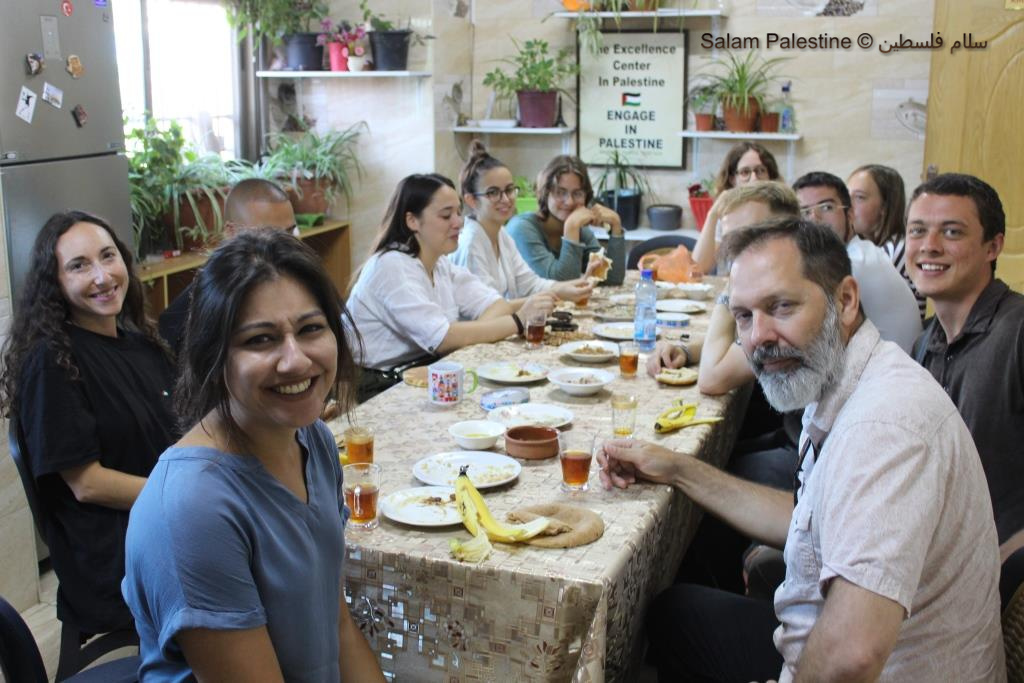
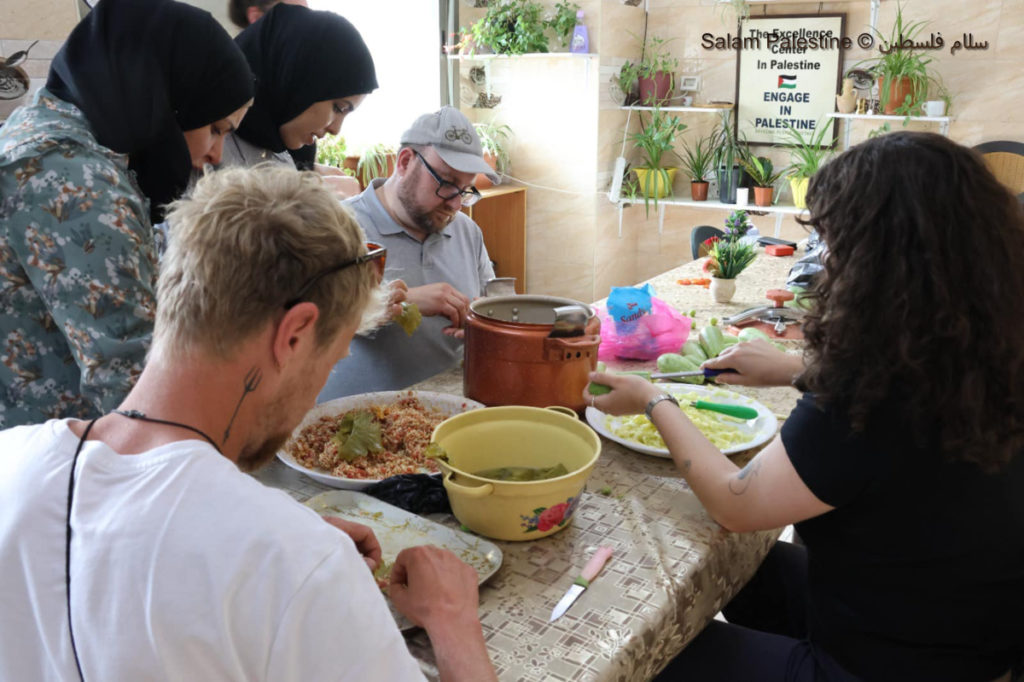
Start and End Dates
Studying Arabic with Salam Palestine is available year-round and has no official application deadlines; when you decide to start is entirely up to you! Students may choose their starting and end dates however they see fit, for up to a three-month stay.
The minimum study duration of the MSA Program is one week. As the Intensive Courses take 4 weeks to complete, however, most students register for a period of from 4 to 13 weeks. On average, it takes 4 weeks of intensive study to complete one level (around 80 hours of class time).
Summer Semester
Especially for students seeking to study Arabic in the summer or travel abroad for a gap year, Salam Palestine offers the Summer Intensive Modern Standard Arabic program, which includes Intensive Arabic courses in addition to other non-intensive study courses. These intensive courses are a great way to rapidly develop your Arabic ability, particularly if you are studying Arabic to take a volunteer opportunity or internship abroad in an Arabic-speaking country.
Each Summer Intensive Arabic course has a duration of four weeks and students are welcome to study from one to three months. If you wish, you may continue to the next level after passing a final exam and giving an oral presentation. Additionally, academic credit is available to current university students students seeking a Summer internship in Palestine.
Which Arabic Course Is For Me?
If you are having difficulty deciding on which course to enroll in, Salam Palestine offers a free placement test to evaluate students’ Arabic language skills in 4 crucial areas: speaking, reading, writing, and listening. We are always happy to consult with you if you have any questions regarding course levels or intensity.
Living In Palestine
While staying in Hebron, you will either reside with a Palestinian host family or in a dorm. There are advantages to both options. For those staying in the dorm, you will have extra time to become acquainted with other students. These will be students of Arabic, as well as the other International participants taking volunteer programs or internships. Furthermore, the dorms are located in Hebron’s metropolitan center, providing ample opportunities for exploring the city on your own or in the company of your colleagues.
The second option of residing with a host family will provide an intimate view of daily life, customs, and culture. It will also give you a chance to become familiar with family structures and sample some delicious Palestinian cuisine. It’s also likely that participants will be attending host family gatherings and cultural events, guaranteeing a culturally immersive experience! However, we can guarantee a homestay only for female students, and it is subject to availability for male students. So we recommend applying to the program of your choice as early as possible to secure your place and homestay.
No matter which housing option participants have, your time in Palestine is guaranteed to be immersive, enriching, and memorable! To start, Hebron is located at the heart of the Levant. This provides ample opportunities for visiting cultural sights, historical monuments, and many other landmarks. Although Palestine’s situation can at times be difficult, participants will find that the Palestinian people are friendly and open. Furthermore, Palestine, in general, is a safe place to visit!
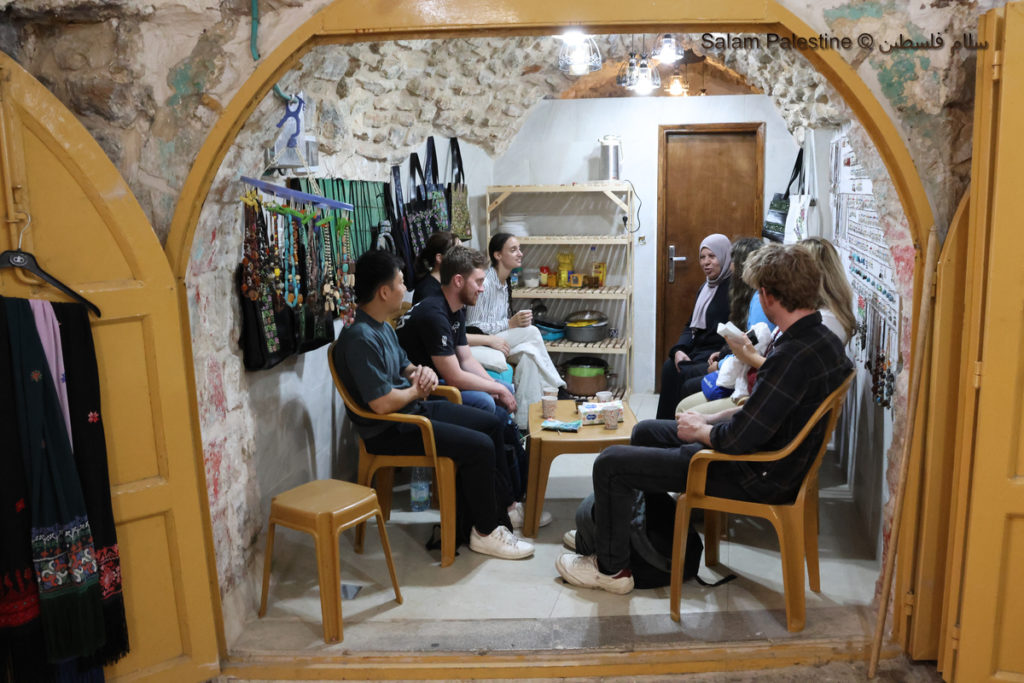
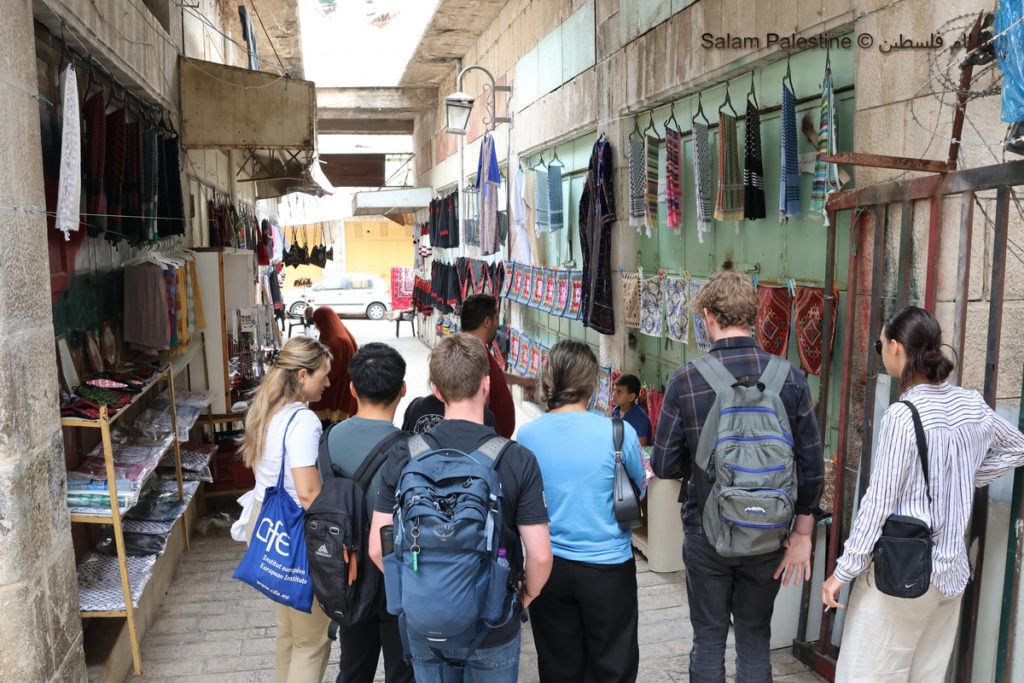
Student Requirements
Salam Palestine does not discriminate on any basis. Your nationality, ethnicity, religion, gender, sexual orientation, or any other discernible differences don’t matter here. There are only 3 main criteria we request from participants:
- Students should be between 18-70 years of age. This age restriction may be waived, however, if granted special permission by Salam Palestine’s director.
- We require all prospective students to have working knowledge of English and/or Arabic since these are the primary languages used during the program.
- Finally, we ask all participants to have a positive attitude, an open mind, and an eagerness to learn.
Competitive Pricing
Salam Palestine prices are relative to other study abroad programs and cover other expenses aside from the Arabic lessons. The price of a course depends on the intensity and is paid every week. The program fee per week is as follows:
- Non-Intensive: €370
- Intensive: €450
- Super Intensive: €700
- (Confirm Prices Here)
All Students also pay a one-time registration fee of €30. Program prices listed on this webpage are the complete and final costs students will pay. There are no hidden or additional fees.
Program Fees Cover:
- Placement Tests
- Language courses
- Study Material and Workbooks
- Housing for the duration of your stay
- Operational expenses
- Arrival and pre-departure assistance
- Breakfast 5 days a week
- Excursions in Hebron arranged by Salam Palestine, including the old city of Hebron, local companies, refugee camps, and local universities such as the Palestine Polytechnic University and Hebron University
- A certificate upon completion
MSA Program Information Overview
| Modern Standard Arabic Courses | Super-Intensive Program | Intensive Program | Non-Intensive Program |
| Program Duration | 1-13 weeks | 1-13 weeks | 1-13 weeks |
| Tuition Hours Per Week | 30 | 20 | 12 |
| Days Per Week In Class | 5 | 5 | 3 |
| Lesson Duration | 45 minutes | 45 minutes | 45 minutes |
| Average Class Size | 1-3 students | 1-3 students | 1-3 students |
| Maximum Class Size | 5 students | 5 students | 5 students |
| Program Levels | Beginner Elementary 1 Elementary 2 Intermediate 1 Intermediate 2 Advanced | Beginner Elementary 1 Elementary 2 Intermediate 1 Intermediate 2 Advanced | Beginner Elementary 1 Elementary 2 Intermediate 1 Intermediate 2 Advanced |
| Lesson Periods | Morning 8:30-12:30 Afternoon 12:30-16:00 | Morning 8:30-12:30 Afternoon 12:30-16:00 | Morning 8:30-12:30 Afternoon 12:30-16:00 |
| Application Deadline | No Deadline | No Deadline | No Deadline |
| Start/End Dates | Flexible | Flexible | Flexible |
| Program Fee Per Week | 700€ (Euro) (Confirm Prices Here) | 450€ (Confirm Prices Here) | 370€ (Confirm Prices Here) |
| University Credit | Available | Available | Available |
How To Apply
If you would like to participate in our Modern Standard Arabic Program, please contact us at Info@ecpalestine.org. We aim to respond to your initial inquiry within 1-2 business days.
In the subject line of your email, write “Study Modern Standard Arabic,” and we will reply with an application form attached. Please fill this out and return it to us to begin the process.
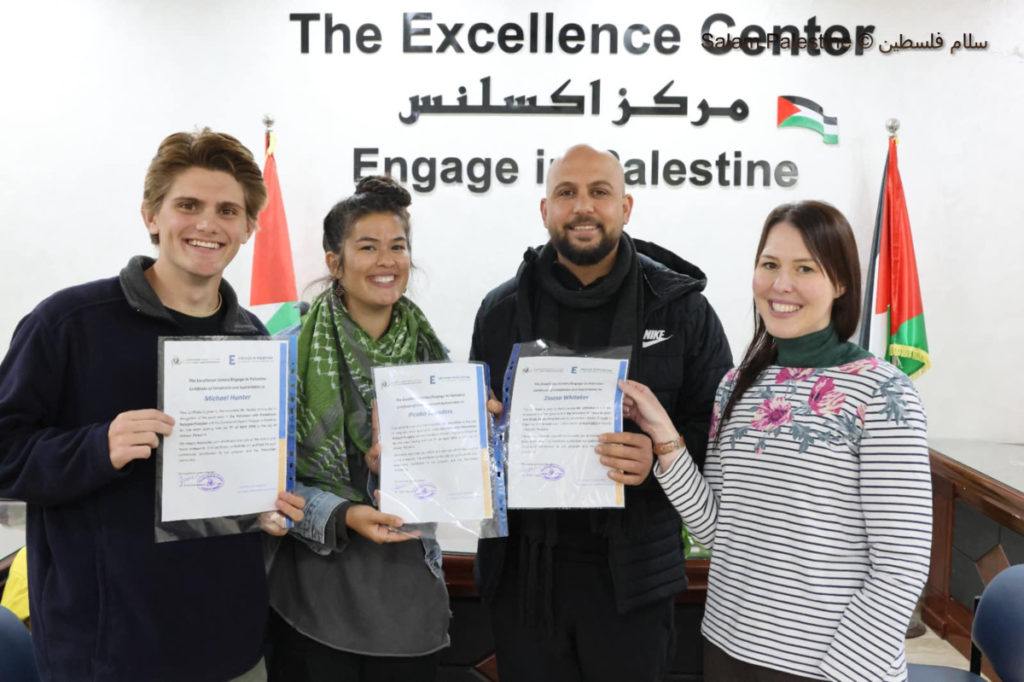
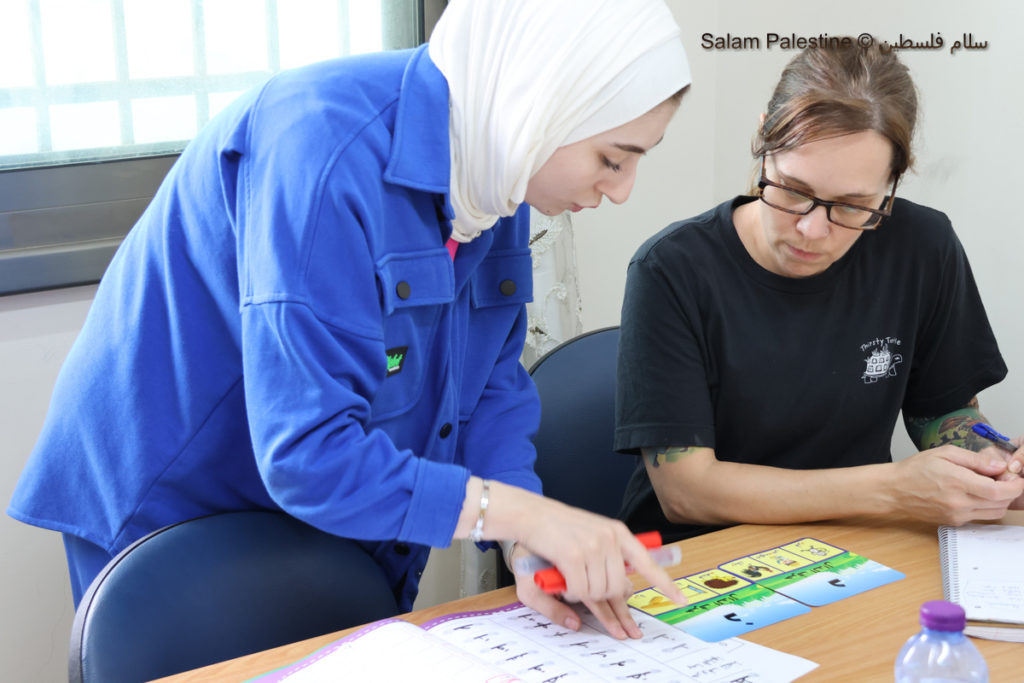
Reviews and Community Awards
Salam Palestine has been honored with several prestigious Community Awards and recognized as the Best Language School and Top Volunteer and Internship Program Provider for 2019, 2021, 2022, 2023, and 2024. For more details, please visit our profiles on GoOverseas.com and GoAbroad.com.
- +870 reviews (96%) on gooverseas.com
- +175 reviews (96%) on goabroad.com
- Participants’ video testimonials
Conclusion
The Modern Standard Arabic Program enables you to immerse yourself in the Arabic-speaking world inside and outside the classroom. In addition to staying in the heart of the Levant, you will be deep within Palestinian culture. You will also acquire language skills that unify Arabic speakers across 25 countries. In these countries, MSA serves as the standard lingua franca in news, academia, and diplomacy. On top of that, MSA serves as a foundation for learning colloquial dialects later.
MSA is a linguistic passport to rich literature, religious studies, and philosophy unique to the Arab world. With Intensive, Super-Intensive, and Non-Intensive courses across six levels, from beginner to advanced, we will customize classes according to your particular needs with our qualified and experienced teachers. If you would like to join our community in Hebron, West Bank, for the Modern Standard Arabic Program, please see our instructions above on how to begin your journey. We are looking forward to hearing from you!
Find Us Online
Do you have questions about our work? Contact us:
Email: info@ecpalestine.org
WhatsApp:+972 599 479 880
Website: https://salampalestine.org/
EC Website: https://excellencenter.org/
Instagram: https://www.instagram.com/excellence.center
Facebook page: https://www.facebook.com/ExcellenceCenter
Facebook account: https://www.facebook.com/RafatECHebron
Watch us on YouTube: https://www.youtube.com/channel/UCsQSLdFZWZcBm6Uj0XMYuKg
Visit and Explore Palestine: https://www.facebook.com/ExplorePalestine
